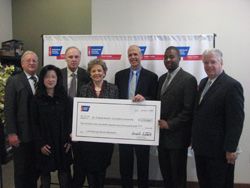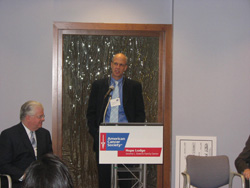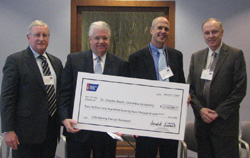Filed Under > Research/Publications
Fighting Colorectal Cancer
American Cancer Society awards TC's Charles Basch and Randi Wolf a $2.1-million grant to study colorectal screening
Charles Basch, Richard March Hoe Professor of Health Education at Teachers College, and Randi Wolf, Associate Professor of Human Nutrition at Teachers College, have received a $2.1-million grant from the American Cancer Society for research promoting colon cancer screening in low-income and minority populations.
The grant is the largest ever awarded in the American Cancer Society’s Eastern Division, which is comprised of New York and New Jersey Colon cancer is highly treatable when diagnosed early, yet is the second leading cause of cancer deaths among U.S.
“We struggle to convince people to pursue early detection, in part because they don’t love the screening test,” said Donald Distasio, Chief Executive Officer of the American Cancer Society of New York and New Jersey, in presenting Basch with a check at a special ceremony at Hope Lodge, the ACS patient residence facility in New York City, on February 13. “As a result, we are nowhere near achieving the kind of screening rates seen with, say, mammography.”
Basch and Wolf have previously demonstrated that telephone outreach can increase colorectal screening in a hard-to-reach, low-income, urban minority population. In a study published in the December 2006 issue of American Journal of Public Health, they showed that, compared to a group receiving printed materials by mail, recipients of telephone outreach were 4.4 times more likely to undergo screening (27 percent versus 6 percent).
“While the effect of the telephone outreach was large, we were disappointed that most of those we talked with by telephone remained unscreened,” Basch says. “Our hundreds of telephone calls led us to appreciate the potential effect of the doctor’s recommendation on patient screening behavior. Primary care physicians did not consistently provide strong encouragement for colorectal cancer screening, according to some of the patients. We believe primary care physicians are in a powerful position to increase the likelihood of screening.
In the new study, Basch plans to evaluate the effectiveness of two intervention programs, both separately and in combination. In one intervention, study workers will again prompt patients by telephone to seek screening and at the same time visit the patient’s primary care physician to promote greater encouragement for colon cancer screening. In the other, the workers will only make in-person visits to the patients’ primary care physicians. Patients in the third arm of the study will receive educational materials promoting colon cancer screening sent by mail.
The study will be conducted over a five-year period. The participant population will be drawn from the 1199 Service Employees International Union, as Basch has done in previous work. In the New York City
“Our doctor-directed outreach educates physicians about low rates of screening and the need to motivate patients to be screened,” Basch says. “We provide educational materials to distribute in the office setting and simple, yet effective tools for remembering to address this topic during a typical office visit.”
During Basch’s 25 years at Teachers College, he has directed approximately $15 million in grant-funded research and program development, primarily supported by the National Institutes of Health, and his work has yielded more than 100 publications. He was the founding Chair of the Department of Health and Behavior Studies, and served in that role from 1996 through 2007.
“It might surprise you to know that this kind of work goes on at a place called Teachers College,” TC Provost Thomas James said in his remarks at the ACS ceremony. “But we believe strongly that you can’t look at education and health separately. They are very much intertwined, and Chuck’s work exemplifies what TC is all about.”
Published Wednesday, Feb. 25, 2009


